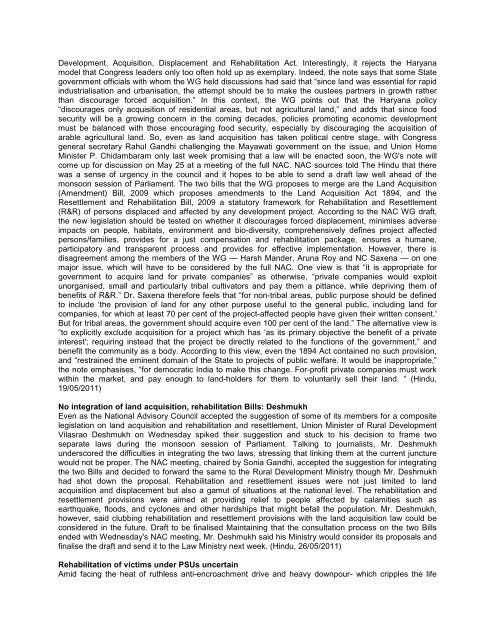land acquisition/sez & displacement â 2011 - Indian Social Institute
land acquisition/sez & displacement â 2011 - Indian Social Institute
land acquisition/sez & displacement â 2011 - Indian Social Institute
Create successful ePaper yourself
Turn your PDF publications into a flip-book with our unique Google optimized e-Paper software.
Development, Acquisition, Displacement and Rehabilitation Act. Interestingly, it rejects the Haryanamodel that Congress leaders only too often hold up as exemplary. Indeed, the note says that some Stategovernment officials with whom the WG held discussions had said that “since <strong>land</strong> was essential for rapidindustrialisation and urbanisation, the attempt should be to make the oustees partners in growth ratherthan discourage forced <strong>acquisition</strong>.” In this context, the WG points out that the Haryana policy“discourages only <strong>acquisition</strong> of residential areas, but not agricultural <strong>land</strong>,” and adds that since foodsecurity will be a growing concern in the coming decades, policies promoting economic developmentmust be balanced with those encouraging food security, especially by discouraging the <strong>acquisition</strong> ofarable agricultural <strong>land</strong>. So, even as <strong>land</strong> <strong>acquisition</strong> has taken political centre stage, with Congressgeneral secretary Rahul Gandhi challenging the Mayawati government on the issue, and Union HomeMinister P. Chidambaram only last week promising that a law will be enacted soon, the WG's note willcome up for discussion on May 25 at a meeting of the full NAC. NAC sources told The Hindu that therewas a sense of urgency in the council and it hopes to be able to send a draft law well ahead of themonsoon session of Parliament. The two bills that the WG proposes to merge are the Land Acquisition(Amendment) Bill, 2009 which proposes amendments to the Land Acquisition Act 1894, and theResettlement and Rehabilitation Bill, 2009 a statutory framework for Rehabilitation and Resettlement(R&R) of persons displaced and affected by any development project. According to the NAC WG draft,the new legislation should be tested on whether it discourages forced <strong>displacement</strong>, minimises adverseimpacts on people, habitats, environment and bio-diversity, comprehensively defines project affectedpersons/families, provides for a just compensation and rehabilitation package, ensures a humane,participatory and transparent process and provides for effective implementation. However, there isdisagreement among the members of the WG — Harsh Mander, Aruna Roy and NC Saxena — on onemajor issue, which will have to be considered by the full NAC. One view is that “it is appropriate forgovernment to acquire <strong>land</strong> for private companies” as otherwise, “private companies would exploitunorganised, small and particularly tribal cultivators and pay them a pittance, while depriving them ofbenefits of R&R.” Dr. Saxena therefore feels that “for non-tribal areas, public purpose should be definedto include ‘the provision of <strong>land</strong> for any other purpose useful to the general public, including <strong>land</strong> forcompanies, for which at least 70 per cent of the project-affected people have given their written consent.'But for tribal areas, the government should acquire even 100 per cent of the <strong>land</strong>.” The alternative view is“to explicitly exclude <strong>acquisition</strong> for a project which has ‘as its primary objective the benefit of a privateinterest'; requiring instead that the project be directly related to the functions of the government,” andbenefit the community as a body. According to this view, even the 1894 Act contained no such provision,and “restrained the eminent domain of the State to projects of public welfare. It would be inappropriate,”the note emphasises, “for democratic India to make this change. For-profit private companies must workwithin the market, and pay enough to <strong>land</strong>-holders for them to voluntarily sell their <strong>land</strong>. ” (Hindu,19/05/<strong>2011</strong>)No integration of <strong>land</strong> <strong>acquisition</strong>, rehabilitation Bills: DeshmukhEven as the National Advisory Council accepted the suggestion of some of its members for a compositelegislation on <strong>land</strong> <strong>acquisition</strong> and rehabilitation and resettlement, Union Minister of Rural DevelopmentVilasrao Deshmukh on Wednesday spiked their suggestion and stuck to his decision to frame twoseparate laws during the monsoon session of Parliament. Talking to journalists, Mr. Deshmukhunderscored the difficulties in integrating the two laws, stressing that linking them at the current juncturewould not be proper. The NAC meeting, chaired by Sonia Gandhi, accepted the suggestion for integratingthe two Bills and decided to forward the same to the Rural Development Ministry though Mr. Deshmukhhad shot down the proposal. Rehabilitation and resettlement issues were not just limited to <strong>land</strong><strong>acquisition</strong> and <strong>displacement</strong> but also a gamut of situations at the national level. The rehabilitation andresettlement provisions were aimed at providing relief to people affected by calamities such asearthquake, floods, and cyclones and other hardships that might befall the population. Mr. Deshmukh,however, said clubbing rehabilitation and resettlement provisions with the <strong>land</strong> <strong>acquisition</strong> law could beconsidered in the future. Draft to be finalised Maintaining that the consultation process on the two Billsended with Wednesday's NAC meeting, Mr. Deshmukh said his Ministry would consider its proposals andfinalise the draft and send it to the Law Ministry next week. (Hindu, 26/05/<strong>2011</strong>)Rehabilitation of victims under PSUs uncertainAmid facing the heat of ruthless anti-encroachment drive and heavy downpour- which cripples the life

















